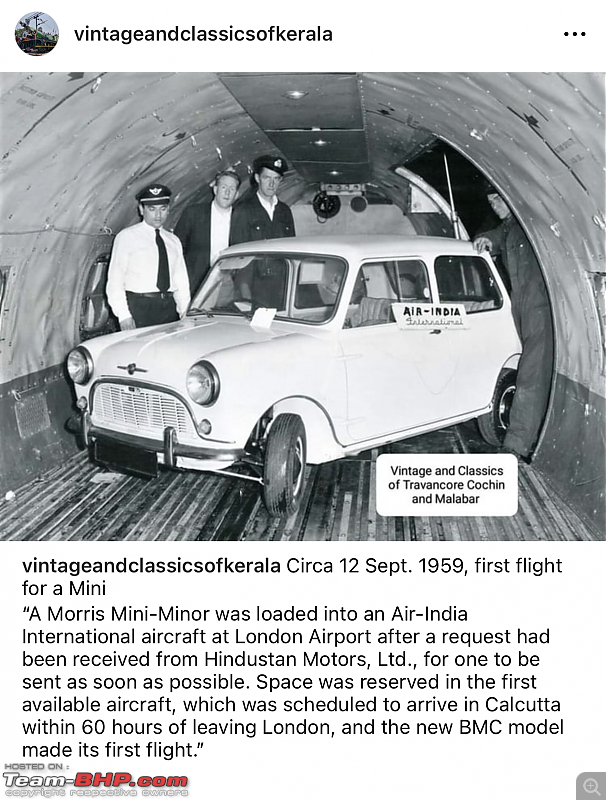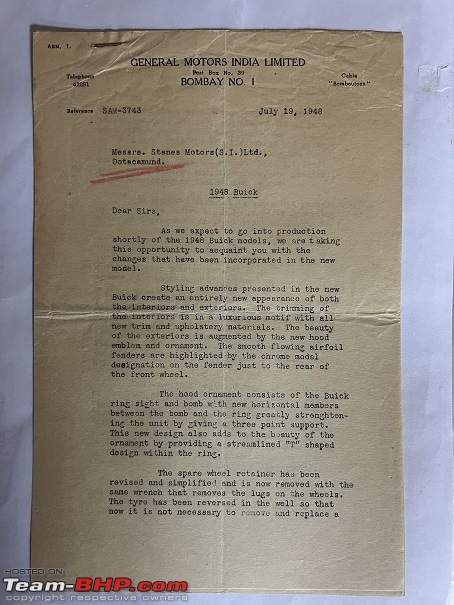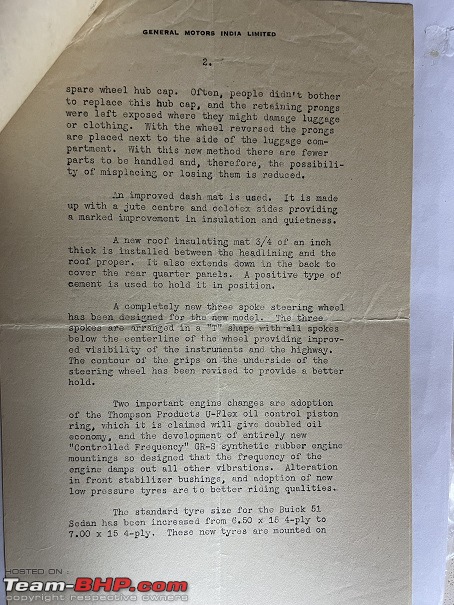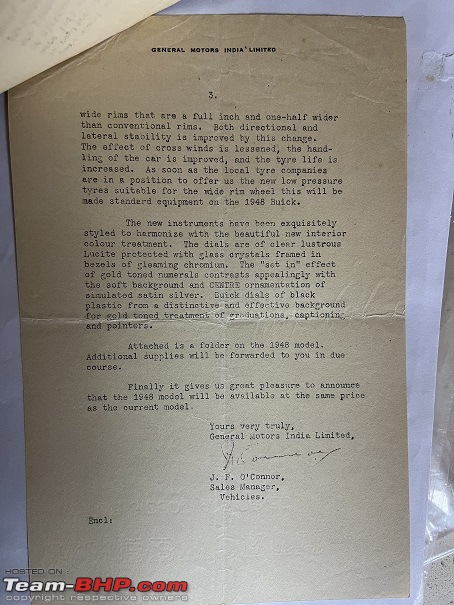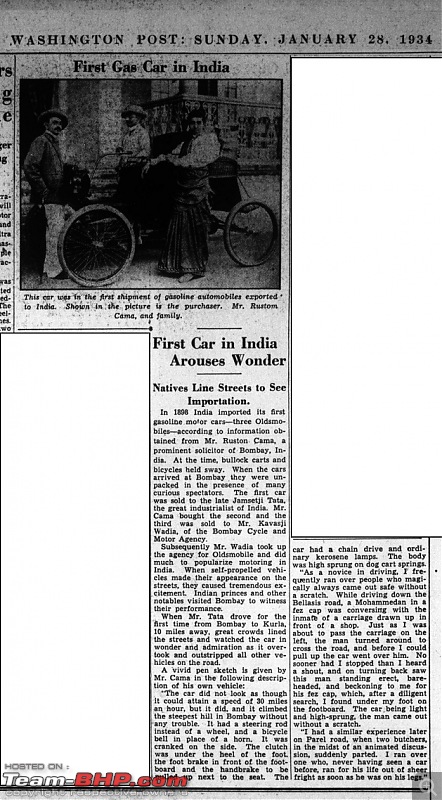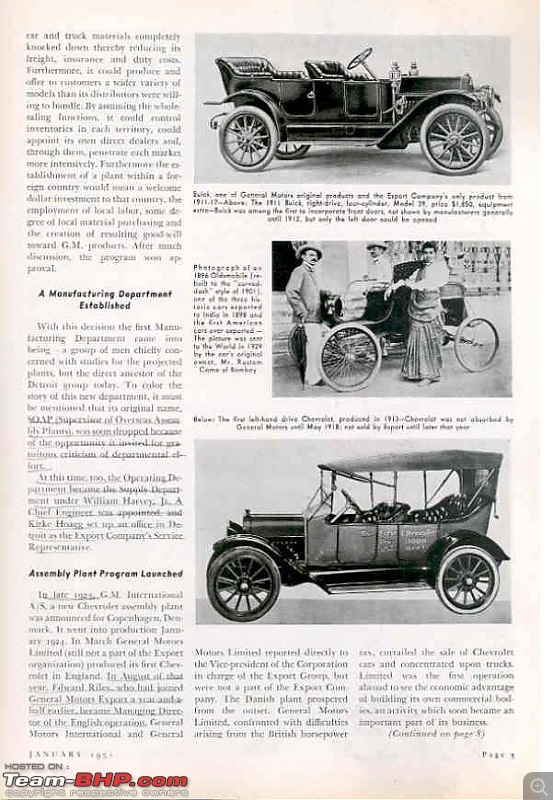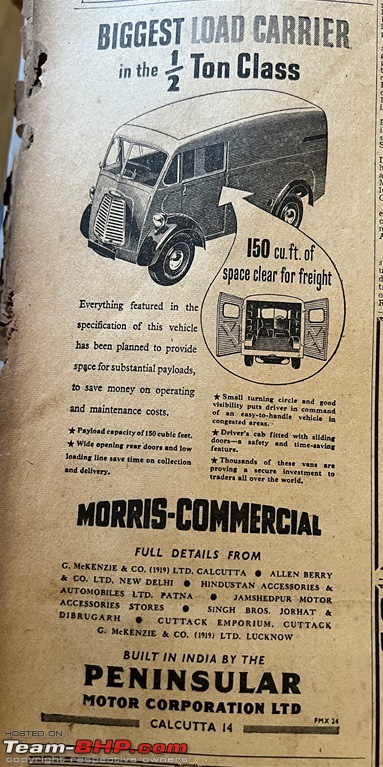| Distinguished - BHPian
Join Date: Jul 2008 Location: India
Posts: 8,493
Thanked: 21,652 Times
| Re: History of Cars in India
Here is the judgment by the Calcutta High Court from 23.11.1984, wherein Hindustan Motors (HM) had challenged the levy of additional taxes levied by the West Bengal Motor Vehicles Tax Act 1979, the amounts being the difference of road tax during the period from 1st June 1979 to 1st July 1981. The Taxing Officer (Motor Vehicles), District Hooghly had issued notice for payment of such additional taxes with notices bearing Nos. 835/MV dated 30th June 1981, 1731 M. V. dated 16th Oct. 1981 and 1442-M.V. dated 6th Nov., 1982 for Rs. 6,08,341.38 p; Rs 4,19,552.15 p. and Rs 1,02,896.61 p. respectively. The Taxing Officer's advocate emphasised that the additional taxation notices were issued, due to the fact that the brand new cars were owned by the company viz. HM, under the sub-heading 'A" in item 1(4) (Motor Cars owned by Companies registered under the Companies Act 1956), in terms of the provisions of West Bengal Motor Vehicles Tax Act 1979. The case is interesting to read as the car manufacturer cites in his plaint that the Ambassador cars/ Trekker/ Hindustan truck chassis were transported by rail earlier, but by road now without any load or passengers, to several destinations and these are evidences of such transport in the earlier years as stated in their affidavit, that are now history. Trade certificates were issued to HM the Road Transport Authority, Hooghly dist (W.B.). The judgment by Single Judge Bench comprising Justice U.C. Banerjee distinguishes the rights over the new vehicles temporarily "owned" by a manufacturer vis-a-vis larger rights vested upon the rightful owners, post their delivery. Needless to say, that the Taxing Officer's notices were quashed by the High Court as HM did not come under the dictionary meaning of "owner". Please read through the text of the judgment as many interesting bits and pieces are revealed :- Quote:
Calcutta High Court
Hindustan Motors Ltd. vs State Of West Bengal And Ors. on 23 November, 1984
Equivalent citations: AIR 1985 Cal 441, 89 CWN 459
Author: U Banerjee
Bench: U Banerjee
ORDER U.C. Banerjee, J.
1. This writ petition is directed against three several demand Notices issued by the Taxing Officer (Motor Vehicles), District Hooghly bearing Nos. 835/MV dated 30th June 1981, 1731 M. V. dated 16th Oct. 1981 and 1442-M.V. dated 6th Nov., 1982 for Rs. 6,08,341.38 p; 4,19,552.15 p. and 1,02,896.61 p. respectively under the provisions of West Bengal Motor Vehicles Tax Act 1979 being the difference of road tax during the period from 1st June 1979 to 1st July 1981.
2. Section 3 of the West Bengal Motor Vehicles Tax Act 1979 (West Bengal Act IX of 1979) provides that every owner of a registered motor vehicle or every person who owns or keeps in his possession or control any motor vehicle shall pay tax on such vehicle at the rate specified in the schedule. Subsection (2) of Section 3 provides that the State Government may by notification in the official Gazette from time to time increase the rates of tax specified in the schedule. Provided however that such increase shall not exceed in the aggregate 50% of the rate specified in the schedule on the date of commencement of the said Act.
3. Section 22 of the Motor Vehicles Act 1939 (Act IV of 1939) provides that no person shall drive any motor vehicle and no owner of motor vehicle shall cause or permit the vehicle to be driven in any public place or in any other place for the purpose of carrying passenger or goods unless the vehicle is registered in accordance with the provisions laid down in Chapter III of Act 1939 and the certificate of registration of the vehicle has not been suspended or cancelled and the vehicle carries a registration mark displayed in the prescribed manner.
4. Section 25 of the Act of 1939 provides that the owner of a motor vehicle may apply to any registering authority to have the vehicle temporarily registered in the prescribed manner and for the issue in the prescribed manner for temporary certificate of registration and temporary registration mark. Section 25 further provides that such registration shall be valid for a period of one month and shall not be renewable provided however that if the registered vehicle is only a chassis to which the body has not been attached and the same is detained in a workshop beyond the said period of one month for being fitted with a body, the period of payment of such fees may be extended by further period or periods, but may not exceed in any case three months.
5. Rule 46 of the Bengal Motor Vehicles Rules 1940 framed by the Government of West Bengal (Home Transport) Department provides that Section 22 of the Act 1939 shall not apply to a motor vehicle in possession of a manufacturer of or dealer in motor vehicle in the course of the business of the manufacturer or dealer so long as it is used under the authorisation of a trade certificate granted by the registering authority within whose area the manufacturer or dealer has his place of business. Rule 46 thereafter goes on to deal with the formalities required for the purpose of issuance of the trade certificate.
6. At this stage 1 may briefly refer to the facts relevant for the present purpose.
7. The petitioner is a manufacturer of Motor Cars, Trekkers and trucks only on chassis or with body, buses big or small sizes heavy vehicles and other engineering products. The vehicles when ready as per order and specification of the dealers are sent by road to different dealers in the country directly from the factory at Hind Motor, Hooghly. The dealers take over the vehicles thus sent on road at their show rooms and thereafter deliver the vehicles to the actual buyers upon completion of the registration formalities before the respective State Authorities within whose jurisdiction the dealers carry on business.
8. In the past Indian Railways used to carry the said vehicles by specially contracted wagons and question of temporary registration or the payment of road tax in the State of West Bengal did not arise but by reason of difficulties experienced in such railway movement the petitioner reverted to the procedure for delivery of the said vehicles by road to its dealers at various points in the country. The said vehicles move out of the factory almost daily in the form of convoys but are prohibited from carrying any passenger or any goods. These convoys of vehicles move on continuously subject to such necessary rest for men and machine and cross over the State of West Bengal and other different States as they comes on the way till the same are delivered to the respective dealers.
9. The respondent authority charged Rs. 33.00 for each car and a similar amount for Trekker and the petitioner however paid the same without any demur or protest. Subsequently however the respondent authority served a notice in which an additional sum of Rs. 26.17 was levied for cars and Trekkers alike on the ground that the writ petitioner comes under the sub-heading 'A" in item 1(4) (Motor Cars owned by Companies registered under the Companies Act 1956) in terms of the provisions of West Bengal Motor Vehicles Tax Act 1979. By the aforesaid notice a demand to the extent of Rs. 6,08,341.38 p. w as raised being the amount said to have been short paid for the year 1980-81. Another notice was sent on 16th Oct. 1981 and the demand made was to the extent of Rs. 4,19,552.19. There was yet a further notice dated 6th Nov. 1982 wherein the demand has been made to the extent of Rs. 1,02,896.61 p. From the records it appears that the petitioner has already paid total sum of Rs. 12,50,375.00 p. on account of temporary registration and further sum of Rs. 43,06.315.74 on account of road tax during the periods 1978-79 to 1981-82.
10. The principal contention raised in the writ petition is that the Respondent authority has no right or authority in law to demand any sum, on account either of temporary registration charges or on account of road tax charges by reason of the express language used in Section 3 of the 1979 Act. Dr. Mukherjee appearing in support of the application contended that Section 3 being the charging section of 1979 Act does not cover the case of the manufacturers. Dr. Mukherjee contended that the language of Section 3 is categorical in its applicability and the money collected on account of temporary registration fees or on account of road tax from the petitioner being the manufacturer of various types of motor vehicles are wholly illegal and without jurisdiction. In that view of the matter Dr. Mukherjee submitted that this Court should direct refund of the sum wrongfully and illegally collected.
11. Dr. Mukherjee further submitted that under Rule 46 of the West Bengal Motor Vehicles Rules 1940 the applicability of the provisions as contained in Section 22 of the Motor Vehicles Act 1939 have been excepted and as such question of any temporary registration charges does not and cannot arise in any event. Dr. Mukherjee contended that the respondent authority being the creature of the statute are lo act in a manner consistent with the provisions of the statute and not dehors the same. The manufacturer has to obtain a trade certificate upon payment of the prescribed tax under the Rules of 1940 which are still in force.
12. Mr. A. P. Chatterjee appearing for the respondents however contended that Section 22 of 1939 Act has no manner of application in the facts and circumstances of the instant case and as such Rule 46 is automatically excluded from its application. Mr. Chatterjee contended that Section 3 of 1979 Act specifically refers to "owner" which in proper method of construction of statute should be read to include a "manufacturer". Mr. Chatterjee contended that Section 3 also speaks of possession and control of motor vehicle. The possession and control of the vehicle is kept with the manufacturer till such time it is sold out to different customers, and as such Section 3 has its application in full force and consequently the liability to pay road tax under the 1979 Act cannot be disputed.
13. The West Bengal Motor Vehicles Act 1979 does not define the expression 'owner' or owns or keeps in his possession or control'. But Section 2(2) envisages that the words or expressions used in the Act of 1979, but not defined shall have the same meanings as in the Motor Vehicles Act. 1939. Section 2(19) of the 1939 Act defines 'owner' and means where the person in possession of a Motor Vehicle is a minor, guardian of such minor and in relation to a motor vehicle which is the subject of a hire purchase agreement, the person in possession of the vehicle. The expression 'keeps or control' also has not been defined. It is well settled principle of law that while interpreting a statute and the words or expression used therein, in the absence of a definition for the words used ordinary plain English meaning is to be attributed to the expression though not divorced from the context. The word 'manufacturer' has its definite connotation in English language. The word 'manufacturer' cannot be used as a synonym with the word owner. Ownership connotes certain rights and privileges which cannot be attributed to the word 'manufacturer". Legislature while enacting a statute engrafts in the statute book words and expressions knowingly and after ascertaining its true and proper meaning. The language of Section 3 envisages, in my view, a stage after the stage of manufacturing of the motor vehicle. User of the words 'the owner of a registered motor vehicle', in my view, clarifies the intention of the legislature. In that view of the matter, the interpretation given by Mr. Chatterjee cannot be accepted.
14. In regard to the expression 'keeps in his possession or control', Mr. Chatterjee submitted that until it is sold out to different customers, the manufacturer retains possession and control and as such in any event Section 3 is attracted in the matter of paymentof road tax and other registration charges. The expressions 'keeps in his possession or control' have not been defined in the Act of 1979 and as such it is to be interpreted in its plain English meaning consistent with the context in which it has been used. Lord Greene observed in Bidie v. General Accident, Fire and Life Insurance Corporation reported in (1948) 2 All ER 995 at p. 998 :
"The first thing one has to do, I venture to think, in construing words in a section of an Act of Parliament is not to take those words in vacuo, so to speak, and attribute to them what is sometimes called their natural or ordinary meaning. Few words in the English language have a natural or ordinary meaning in the sense that they must be so read that their meaning is entirely independent of their context. The method of construing statutes that I prefer is not to take particular words and attribute to them a sort of prima facie meaning which you may have to displace or modify. It is to read the statute as a whole and ask oneself the question; 'In this state, in this context, relating to this subject-matter, what is the true meaning of that word?' "
The said reasoning was also adopted by the Supreme Court in the case of Kesavananda Bharati v. State of Kerala .
15. Lord Wright in James v. Common-wealth of Australia, 1936 AC 578 observed -
"The question, then, is one of construction and in the ultimate resort must be determined upon actual words used, read not in vacuo but as occurring in a single complex instrument, in which one part may throw light on another."
The same view has also been expressed by the Supreme Court in a more recent decision in the case of Prithipal Singh Bedi v. Union of India, .
16. In view of the aforesaid, words "keeps in possession or control" cannot be identified with the manufacturer but to be read in conjunction with the other words viz. owner of a registered motor vehicles or other person who owns the same. The manufacturer may or may not have some control over the vehicle manufactured by him but the juxtaposition of the words used in the section suggests its association with the ownership only. In that view of the matter, and on a proper interpretation of the language used by the legislature in Section 3 of the 1979 Act, the second contention of Mr. Chatterjee also fails.
17. In the view I have taken, I need not deal with the other contention of Dr. Mukherjee in support of which reliance was placed on the decision of the Supreme Court in the case of State of Mysore v. Sundaram Motors Pvt. Ltd.
18. In the premises, therefore, I declare that for the purpose of sending by road motor cars, trucks and other vehicle by the writ petitioners to its dealers, no temporary registration is required neither any road tax under Act IX of 1979 is payable by the petitioners.
19. In regard to prayer for refund of a total sum of Rs. 55,56,710.74 said to have been recovered on account of temporary registration and road tax I am unable to accept the contention of Dr. Mukherjee. While it is true the Supreme Court in the case of M/s. Shiv Shankar Dal Mills v. State of Haryana observed that Article 226 grants an extraordinary remedy which is essentially discretionary, although founded on legal injury and it is perfectly open for the Court exercising this flexible power to pass such order as public interest dictates and equity projects, but in my view so far as refund aspect of the matter is concerned, the Civil Court would be the proper forum and not this Court exercising jurisdiction under Article 226 of the Constitution of India in the facts and circumstances of this case. The decision of the Supreme Court in Shiv Shankar Dal Mills case is not really applicable in the present case.
20. In view of the above, this application succeeds. The notice under challenge is set aside and quashed. The demands made therein are cancelled. The Rule is made absolute to the extent indicated above. There will, however, be no order as to costs.
|
Last edited by anjan_c2007 : 25th May 2024 at 14:28.
|

 (9)
Thanks
(9)
Thanks
 (5)
Thanks
(5)
Thanks

 (6)
Thanks
(6)
Thanks

 (7)
Thanks
(7)
Thanks

 (4)
Thanks
(4)
Thanks

 (4)
Thanks
(4)
Thanks

 (6)
Thanks
(6)
Thanks

 (1)
Thanks
(1)
Thanks

 (3)
Thanks
(3)
Thanks

 (6)
Thanks
(6)
Thanks

 (2)
Thanks
(2)
Thanks

 (2)
Thanks
(2)
Thanks

 (4)
Thanks
(4)
Thanks




